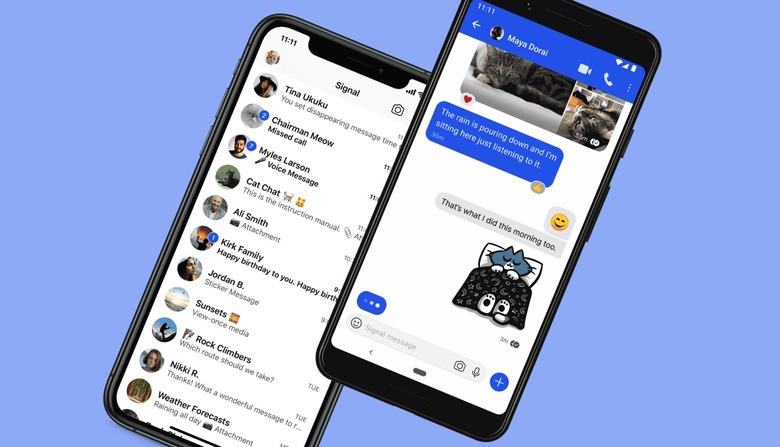Facebook Is Afraid Of Apps That Can Replace WhatsApp
- Facebook responded to the backlash over the new WhatsApp privacy policy changes, explaining in a FAQ that the app will not lose end-to-end encryption and other privacy features in the upcoming update.
- WhatsApp prompted users to agree to the new privacy policy a few days ago. Millions of people downloaded competing instant messaging apps like Signal and Telegram in response.
- Signal and Telegram offer the same end-to-end encryption as WhatsApp and work on iPhone and Android.
- Facebook now tells customers that it's WhatsApp business and commerce features that will lead to data sharing with Facebook.
Facebook confirmed a few days ago that it's about to ruin WhatsApp, as users discovered prompts on Android and iPhone telling them the chat app would start sharing personal data with Facebook. Facebook has been trying to make it seem like it cares about user privacy and security for its users, but its moves say otherwise. The recent attack on Apple following the introduction of the app privacy labels that tell users exactly how terrifying data collection practices can prove that. The decision to start grabbing data from WhatsApp users is also controversial, considering that the only option to opt out is to leave WhatsApp completely. Millions of users have responded to WhatsApp's notification by flocking to competing apps that offer similar services. And now Facebook is already putting up defenses, proving it's afraid of the backlash.
The reason WhatsApp is so popular is quite simple. The app offers end-to-end encryption, just like iMessage and works on both iPhone and Android. It's the perfect app on your phone, tablet, and desktop to keep in touch with all your friends and family, no matter what devices they might use. But WhatsApp isn't the only chat app that can do that.
Signal and Telegram both support end-to-end encryption and work on iPhone and Android. Like WhatsApp and iMessage, they also offer the same features you'd expect from an instant messaging client, including file-sharing, phone calls, emoji, and many of the bells and whistles you'd want from an iMessage alternative.
Both Signal and Telegram have seen massive surges in downloads since the WhatsApp privacy prompt hit phones, with millions of people flocking to download the apps. Even the CEOs of Tesla and Twitter took sides, with Elon Musk endorsing Signal and Jack Dorsey retweeting it. WhatsApp's dominance isn't likely to be threatened anytime soon. But if more people start using competing services like Signal and Telegram, they could move more of their contacts to those platforms in time.
We want to address some rumors and be 100% clear we continue to protect your private messages with end-to-end encryption. pic.twitter.com/6qDnzQ98MP
— WhatsApp (@WhatsApp) January 12, 2021
Facebook is already addressing the privacy problem it created, proving it's very aware of the backlash. The company posted a FAQ section that explains exactly what WhatsApp data Facebook will not be able to collect from users and shared the infographic above on social media.
Facebook will not be able to see your private messages and hear your calls. That was never a worry, as Facebook doesn't intend to remove end-to-end encryption from the app. Facebook also says that WhatsApp will not keep messaging and calling logs and won't see shared location data. WhatsApp will not share contacts, and groups will remain private. The app will support disappearing messages, and users can download their data.
These are all good things, of course. But Facebook doesn't include in the infographic the data WhatsApp will share with Facebook, even though the FAQ section does contain more details about the new WhatsApp privacy update.
"We want to be clear that the policy update does not affect the privacy of your messages with friends or family in any way. Instead, this update includes changes related to messaging a business on WhatsApp, which is optional, and provides further transparency about how we collect and use data," the page reads.
Facebook explains that WhatsApp users who choose to communicate with businesses will have some of their data shared with those companies. "Whether you communicate with a business by phone, email, or WhatsApp, it can see what you're saying and may use that information for its own marketing purposes, which may include advertising on Facebook," the FAQ section reads.
"If you choose to interact with Shops, your shopping activity can be used to personalize your Shops experience and the ads you see on Facebook and Instagram, the FAQ says. "Features like this are optional, and when you use them, we will tell you in the app how your data is being shared with Facebook."
Discovering businesses on Facebook and then contacting them via WhatsApp could also lead to more data tracking. "If you have WhatsApp installed on your phone, you'll have the option to message that business," the page reads. "Facebook may use the way you interact with these ads to personalize the ads you see on Facebook.
UPDATE: Telegram does not offer end-to-end encryption by default. Users need to enable Secret chats to take advantage of the extra protection.
